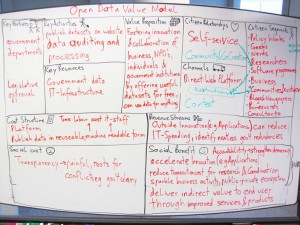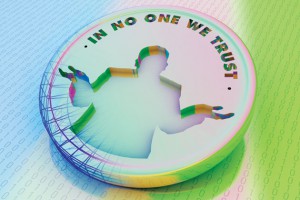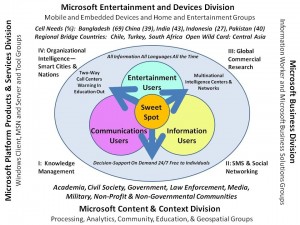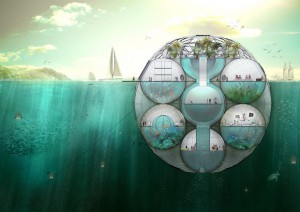
Reference: Bitcoin May Be the Global Economy’s Last Safe Haven
Money
Bitcoin May Be the Global Economy's Last Safe Haven
One of the oddest bits of news to emerge from the economic collapse of Cyprus is a corresponding rise in the value of Bitcoin, the Internet’s favorite, media-friendly, anarchist crypto-currency. In Spain, Google (GOOG) searches for “Bitcoin” and downloads of Bitcoin apps soared. The value of a Bitcoin went up to $78. Someone put out a press release promising a Bitcoin ATM in Cyprus. Far away, in Canada, a man said he’d sell his house for BTC5,362.
Bitcoin was created in 2009 by a pseudonymous hacker who calls him or herself Satoshi Nakamoto (and who might be several people). It’s a form of virtual cash used to buy goods and services online. Even by Web standards, it’s a strange and supergeeky phenomenon. This is what happens when software and networks meet the concept of currency, when you take peer-to-peer networks and advanced cryptography and ask, “How can I make a new economy?”
Yoda: Bad Context: Why nobody, not even Apple, has done mobile right
Architecture
Bad Context: Why nobody, not even Apple, has done mobile right
Your smartphone is dumb. Mine is too. I’ve got an iPhone in my pocket, and a Galaxy S III, and an HTC One, and they’re all stupid. The BlackBerry Z10 in my bag is a clot, and the Lumia 920 isn’t just thick in the hand, it’s just plain thick. Today, on the fortieth birthday of the first cellphone call, the gadget that was supposed to liberate us has turned us into plagued, screen-tapping obsessives, in thrall to every buzz and bleep.
Before you say anything – though I understand you may instantly have raced to the comments section before you even reached the period in my first sentence, desperate to berate me – I’m not a luddite. I love smartphones; I like Android, iOS, Windows Phone, and even have a soft spot for BlackBerry 10 in places. I don’t leave the house without at least one phone in my pocket. It – and its ringing alarm – is the first thing I reach for in the morning; with the exception of the light switch it’s probably the last thing at night.
That devotion, or maybe obsession, doesn’t mean I’m blind to the limitations of what we have today, however. The modern smartphone is faster, lighter, runs longer, has more apps, sensors, radios, and gadgetry than any before it, but all that complexity has only served to pull us in closer, to enmesh us more with the digital world on its terms.

Your phone still, generally, demands you reach for it and proactively consult it. If it has something for you, it’ll beep to let you know, but it’ll generally do that on its own timescale. Many devices have a “do not disturb” mode, which blanks all (or all but the most important) notifications between certain periods, and some can “intelligently” manage alerts depending on what you’re doing at the time, though that tends to amount to little more than bashing calendar entries against the clock and keeping quiet when you’ve remembered to log a meeting taking place.
“Most phones are dumb in how they understand context”
Beyond that, for all their sensors and smarts, most phones are pretty dumb in how they understand context. Right now, they’re portable terminals for the internet, for the most part: a smaller window than our regular browser, or one we view through the medium of function-specific apps. Much of the development we’ve seen from phone software and hardware over the past 3-5 years has been in translating the internet into something that fits onto a smartphone-scale screen.
SmartPlanet: Bio-Pods in Ocean + Unstoppable Renewable Grid
05 Energy, SmartPlanet![]() Bloom: Photosynthetic pods for mid-ocean living
Bloom: Photosynthetic pods for mid-ocean living
Phytoplankton are microscopic organisms that float around the water surface, harnessing sunlight to make energy for themselves. Like plants, they use chlorophyll to produce oxygen while absorbing carbon dioxide.

So, with impending sea level rises, French architecture firm Sitbon Architectes designed a livable, phytoplankton farm to be installed in the Indian Ocean.
Called the Bloom, the concept behind this large-scale project is “to practice the culture of the phytoplankton to absorb CO2 excesses.”
This 5-level, semi-submersible center will be moored to the seafloor with a system of cables. The part that’s underwater offers housing for resident scientists and aquariums for phytoplankton.
- The structure will be made of aluminum and methacrylate (common in polymer plastics). The total floor area is 2,070 square meters.
- The pod can also monitor water quality and inject phytoplankton into rivers, lakes, and ports to help regulate oxygen levels, accordingly.
- Additionally, since it’s situated in the ocean, the Bloom will be able to alert coastal zones of tsunamis.
Their vision: “every factory would have its own bloom allowing it to absorb the CO2 that it created.”
The project was a finalist in Architizer’s 2013 A+ Awards.
Check out the Sitbon Architectes gallery for more photos and drawings. (Some labels say “diatom,” which is fitting because the Bloom looks glassy, but if you ask me, it looks more like a coccolithophore.)
See Also:
2013 Robert Steele in HighGainBlog on Open and Secret Intelligence
#OSE Open Source Everything, Advanced Cyber/IO
Robert Steele Discusses Open Source and Secret Intelligence
HighGainBlog, 4 April 2013
Robert Steele has been a prescient thinker in the fields of search and content processing for decades. Best known for his work in open source intelligence, Mr. Steele has published widely on what I call “politico-info issues.”
One April 2, 2013 Mr. Steele and I continued our discussion of online information which which appeared in Beyond Search in May of 2008. Most recently, The full text of my discussion with him appears below:
Continue reading “2013 Robert Steele in HighGainBlog on Open and Secret Intelligence”
Stephen E. Arnold: Robert Steele on Open Source Intelligence in 2013
#OSE Open Source Everything, Advanced Cyber/IO
Robert Steele on Open Source Intelligence in 2013
Beyond Search, April 4, 2013
Robert Steele has been a prescient thinker and actor in the intelligence sector for decades. In 1979 he was competitively selected to join the Central Intelligence Agency’s clandestine service. He spent nine years with the CIA, doing three tours overseas as a case officer recruiting and handling agents. In 1986, helped write the Marine Corps Master Intelligence Plan (MCMIP) as well as a plan for a Marine Corps Intelligence Center (MCIC). In the last 30 years, Mr. Steele has worked on a wide range of projects around the world.
In the interview which appeared in HighGainBlog, he said:
For all the money we spend on it, the secret world is not really providing the return on investment taxpayers should expect. Intelligence – decision support – is simply not being provided to everyone that needs it.
His views on the relationship of intelligence to decision support caught my attention as well. He said:
Continue reading “Stephen E. Arnold: Robert Steele on Open Source Intelligence in 2013”
Rickard Falkvinge: Why Bitcoin Is Poised To Change Society Much More Than The Internet Did
Money
Why Bitcoin Is Poised To Change Society Much More Than The Internet Did
Posted: 03 Apr 2013 12:52 PM PDT
Swarm Economy: There is a bitcoin craze at the moment, with prices of bitcoin skyrocketing. Bitcoin is still far from ready for prime time, but as it matures, it will change society’s fundamental operations much more than the Internet did. The net, after all, only allowed people to talk and shop more efficiently. By comparison, bitcoin eradicates the government’s ability to operate.
Let’s begin by looking at what a bitcoin is. It is money. It is a new form of money that isn’t issued by a government. Governments don’t have a monopoly on coming up with things you can trade and barter with, and bitcoin is one such non-governmental barter instrument. The difference between bitcoin and all other such tokens of value that have been invented over the years is that nobody is in control of the money supply, and nobody is in control of the money flow. This means that nobody can start the printing presses to eradicate your savings, and nobody can seize or see your wealth or income. You can think of it as an open-source currency compared to proprietary, state-issued currencies.
There is no central bank. This is a revolutionary concept. People can trade cash at a distance without going through an intermediary. The first time you send the value of a cup of coffee to a friend in India on a Sunday, without any transaction fees, and they have the money instantly, without anybody but you knowing of the transaction, your jaw drops.

